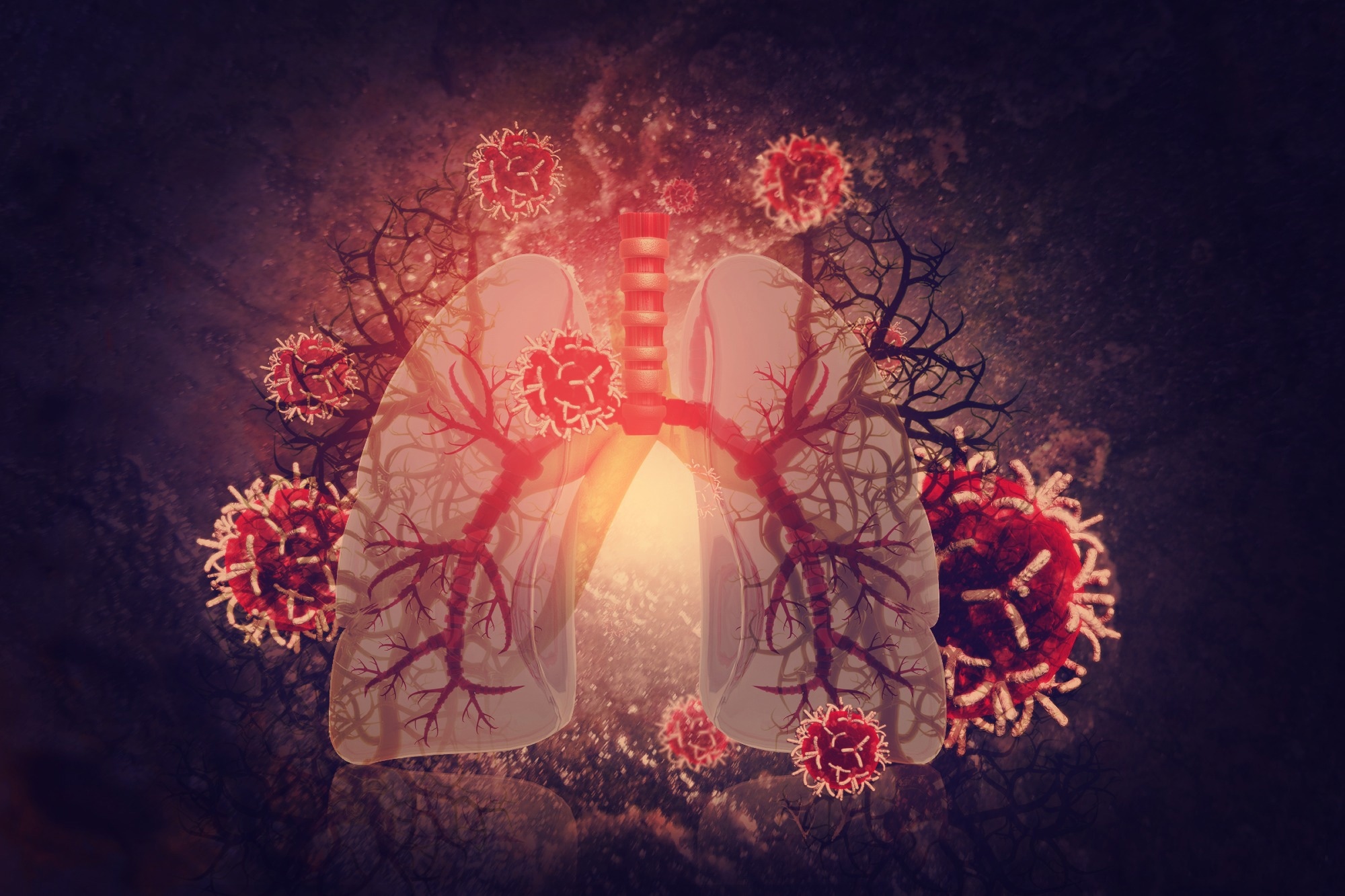The coronavirus disease 2019 (COVID-19) pandemic was caused by the outbreak of severe acute respiratory syndrome coronavirus 2 (SARS-CoV-2). To date, COVID-19 has claimed almost seven million lives worldwide.
Due to high mortality, scientists have extensively studied varied aspects of SARS-CoV-2, including the body’s response against this virus, as well as the possibility of co-infections or secondary infections. The optimal clinical approach has also been explored to reduce the mortality rate and protect more people from contracting COVID-19.
 Study: Analysis of Lung Microbiome in COVID-19 Patients during Time of Hospitalization. Image Credit: crystal light / Shutterstock.com
Study: Analysis of Lung Microbiome in COVID-19 Patients during Time of Hospitalization. Image Credit: crystal light / Shutterstock.com
Background
The primary infection site of SARS-CoV-2 is the human respiratory tract. The clinical outcomes in chronic respiratory diseases are significantly affected due to the interactions between human respiratory microbiota and host immune system.
Several studies have indicated an alteration in respiratory microbiota after viral respiratory infections that potentially modifies the host’s innate immune response, thereby facilitating co-infections and secondary infections. The respiratory microbiome also impacts the colonization and proliferation of pathogens.
SARS-CoV-2 infection promotes microbial dysbiosis by altering the nasal, oropharyngeal, and lung microenvironment. This microbial dysbiosis promotes co-infection or secondary infection, which leads to higher morbidity and mortality in patients with SARS-CoV-2 infection. To design better pharmaceutical approaches and diagnostics, it is important to understand the link between the respiratory microbiota and COVID-19 pathogenesis.
There remains a lack of studies related to the lung microbiome due to limitations in sampling techniques and difficulties in assessing the lower respiratory tract. Although some small-scale studies have assessed the bacterial composition in the lungs of COVID-19 patients, the presence of other microbes like fungi, which may also affect the lungs, has not been discussed. Thus, there remains a need to explore both bacterial and fungal prevalence in the lungs of COVID-19 patients.
About the study
A recent Pathogens study used nanopore sequencing to determine the fungal and bacterial microbiota in the lungs of COVID-19 and non-COVID-19 patients.
Bronchoalveolar lavage fluid (BALF) and sputum samples were collected from thirty-eight patients hospitalized due to COVID-19 and twenty-six non-COVID-19 pneumonia patients. All patients were treated at the Zhongnan Hospital of Wuhan University, China, between February 1, 2020, and August 15, 2020
Subsequently, microbial DNA was extracted from the samples and subjected to nanopore-targeted sequencing following a standardized procedure.
Study findings
Both study groups comprised identical participants in regard to their mean age and gender proportion. Over 75% of the patients present in both groups had comorbidities such as diabetes, coronary artery disease, hypertension, chronic infectious disease, and chronic lung disease.
Patients hospitalized due to SARS-CoV-2 infection required more oxygen support, invasive ventilation, and non-invasive ventilation as compared to non-COVID-19 patients. Both study groups were subjected to antibiotics treatment; however, antiviral and antifungal treatments were more commonly prescribed to COVID-19 patients. A total of 12 COVID-19 patients and six non-COVID-19 patients died during hospitalization.
Consistent with previous studies, laboratory findings of the present study indicated that COVID-19 patients exhibited significantly reduced lymphocyte counts and hemoglobin levels, as well as increased serum amyloid A (SAA) levels and neutrophil to white blood cell ratio.
A significant reduction in microbial diversity and severe microbial dysbiosis was observed in COVID-19 patients. Notably, both bacterial and fungal distribution in COVID-19 patients significantly differed from non-COVID-19 patients.
A higher abundance of opportunistic pathogens was identified in COVID-19 patients, which disrupted the lung ecology. These pathogens might promote coinfections or secondary infections and influence disease severity.
Metagenomic sequencing revealed that as compared to non-COVID-19 patients, Acinetobacter baumannii was present in a significantly higher abundance in most COVID-19 patients. Previous studies have indicated that patients infected with this pathogen are susceptible to severe COVID-19.
More research is required to understand the underlying mechanism by which Acinetobacter overgrows in the COVID-19 lung. This finding could be used to develop effective therapies targeting this bacteria-virus interaction to improve clinical outcomes.
An abundance of Candida spp., particularly Candida glabrata, Candida parapsilosis, and Candida albicans, was also observed in the lungs of COVID-19 patients. Additionally, many bacterial taxa found in the lungs of COVID-19 patients exhibited robust correlations with inflammation indicators.
Conclusions
SARS-CoV-2 infection could be severe to lethal in certain populations, such as the elderly, people with underlying medical conditions, and those with poor immune systems.
A significant difference in the lung microbiome was observed between COVID-19 and non-COVID-19 controls in this study. More specifically, COVID-19 patients exhibited a higher abundance of opportunistic pathogens, particularly Acinetobacter baumannii and Candida spp. Notably, certain pathogens present in the lungs of COVID-19 patients influenced alterations of certain inflammation indicators.
Journal reference:
- Xie, L., Chen, L., Li, X., et al. (2023) Analysis of Lung Microbiome in COVID-19 Patients during Time of Hospitalization. Pathogens 12(7). doi:10.3390/pathogens1207094